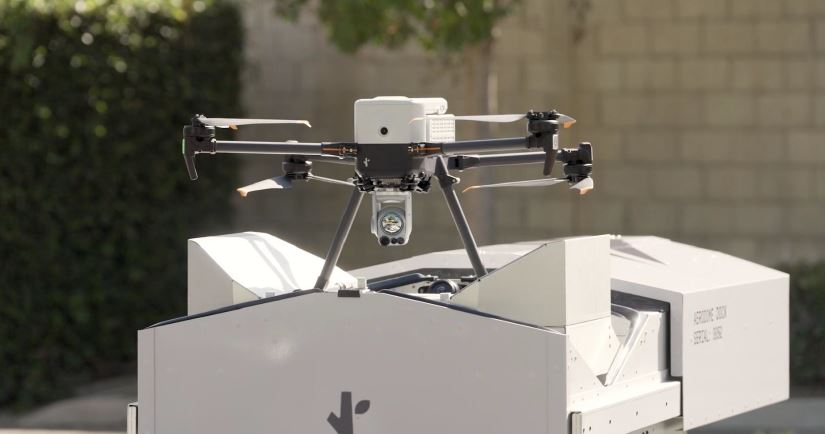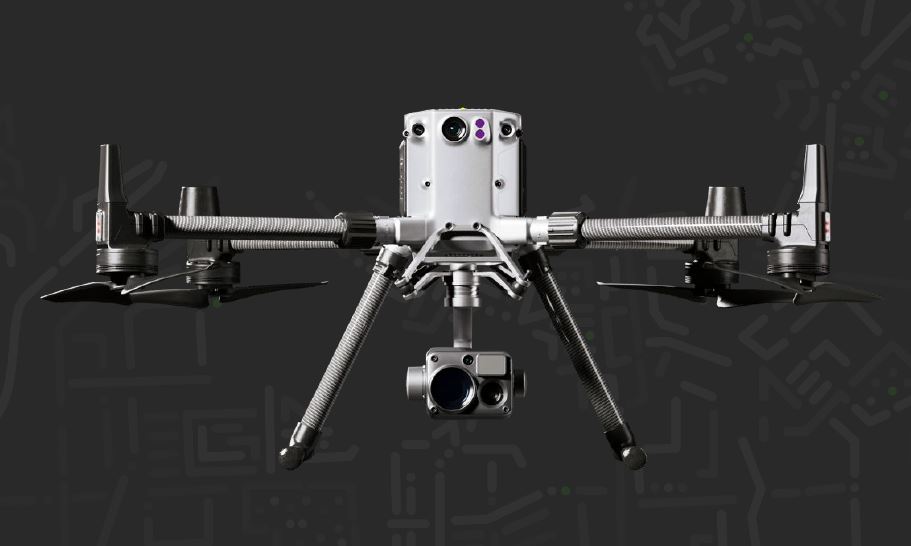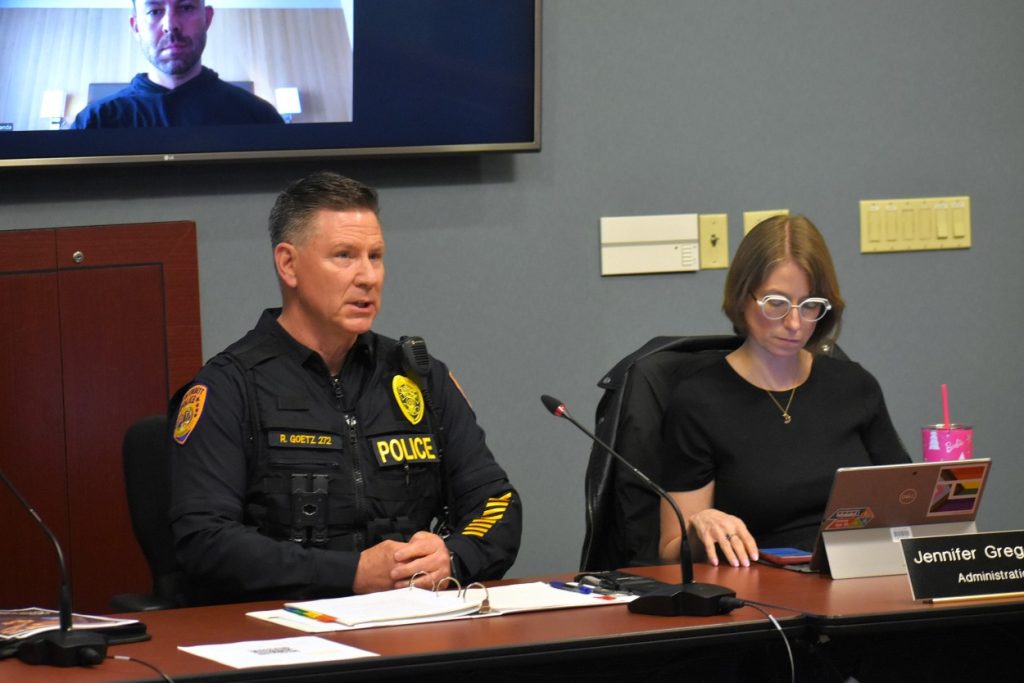EVERETT—Everett becomes the first city in Snohomish County and the second following Redmond in Washington state, to launch a Drone as a First Responder (DFR) program reducing response times on by up to 63 percent—to just under 90 seconds! The council voted 5-1, with Councilwoman Liz Vogeli dissenting, to officially approve the pilot program in partnership with Flock Safety on Wednesday, April 9. Councilwoman Mary Fosse was not present at the meeting.

“As our community’s needs have changed, our police department has evolved, finding ways to use new strategies, staying apprised of best practices and implementing technology that enhances our ability to protect our residents, businesses and visitors,” Everett Mayor Cassie Franklin wrote in a statement to the Lynnwood Times. “Launching Drone as a First Responder brings our use of drones to the next level and I’m excited to see how this new tool helps us continue delivering real results for our community.”
Councilwoman Vogeli dissent vote centered on the risk that the federal government may co-op the technology, overruling the city’s authority and drone policy that was enacted on January 12, 2022.
“The [drone] policy is admirable…but I have great concerns, like great concerns. And I was here for the committee meeting last week. And if we weren’t living in such times that we are right now, I would maybe be comfortable with it,” Vogeli said. “So maybe a question then is considering what is happening so quickly at the federal level and so many of our civil liberties are being erased, or at least they’re being attempted to be erased…how easy would it be to say no? I don’t even know if you can answer that out loud.”
Everett Police Chief John DeRousse emphasized with the council that law enforcement’s authority is derived from the residents of Everett and the relationships his department developed over the years with the community.
“We really get our power to do our job, just like you guys do through the community,” Chief DeRousse said. “And if we were to change that, especially, I mean, we’ll never change it without anybody knowing, but if we were to change that and that would get out to the community, I imagine this room would be full and that there’d be a lot of comments ‘about we don’t want our police department doing that.’”
Councilwoman Paula Rhyne wanted clarification on the cost of the program—$307,000 per year per drone request versus $507,133 in the two-year Flock Safety contract—which Captain Robert Goetz stated had to do with not needing a second radar for the drone assigned to the northern part of the city.
“In order for us to fly in South Everett, because of our proximity to the [Paine Field] airport, we need to have a radar associated with the product,” Captain Goetz said. “So, there’s a radar, and then there’s the drone and the drone dock. To fly in the north end of the city, again, to allow for full coverage of the city to have that second dock, we don’t require that second dock, that second radar. So, we’re talking now about $150,000. So, when you add those two together, plus, of course, tax, that’s where you get the $500,000.”
A DFR Pilot lounge, located in the south precinct equipped with a computer and a couple of screens using M&O funds, will be open to the public in late June. The first DFR flights are expected to commence in late June in advance of July 4th, ahead of all the summer activities.
“We anticipate that some of our younger community members will be attracted to this profession based on the technology that we’re deploying,” Chief DeRousse said, adding, “We’re happy for that side benefit of it as well.”

The drones fly up to 53 mph, have thermal and nighttime vison capabilities, a 400X zoom, and can cover up to 38 square miles per deployment. The drone assigned to the south precinct will fly at an altitude of 400 feet, whereas the north drone will fly at 200 feet. The drones will not be equipped with facial recognition software, won’t track a vehicle’s speed, nor will they be used to aid in parking enforcement.
Captain Goetz shared with councilmembers, the city will be incorporating the DFR program into its existing drone policy that was written in consultation with the A.C.L.U., the Department of Justice, the COPS Office, and the International Association of Chiefs of Police. The existing policy provides guidance on the following:
- Adherence and respect for civil rights;
- Limitations and purpose of use;
- Documentation of operations;
- Data minimization and retention;
- Adherence to FAA regulations;
- Policy management; and
- Abuse prevention and accountability.
The First Responder Drones will integrate with both the Sno911 to provide real-time caller information to the certified officer pilot and EPD’s Automatic License Plate Recognition (ALPR) cameras to combat vehicle thefts. The drone pilots will be certified with the City and trained by officers with an existing FAA Part 107 certification. The drones are also equipped with a collision avoidance system for added community safety.
The Drone as First Responder program will not be used for:
- Proactive routine patrol.
- Random surveillance.
- Immigration enforcement.
- The monitoring of First Amendment activities.
- Tracking persons or vehicles to or from medical facilities to monitor health care services—e.g. Planned Parenthood.
Jennifer Gregerson, Government Affairs Director for the City of Everett, informed councilmembers that the high-definition camera on the drones is forward facing, not looking towards the ground, until it arrives at the incident location.
Chief DeRousse candidly shared that the word “drone” somewhat misrepresents the intent of this new cutting-edge first responder technology analogizing the word to 1980s dystopian sci-fi movies “Robocop” or “Terminator.”
“I think it [drone] sounds like a sentry is going on patrol and taking the place of an officer,” DeRousse said. “That’s not what this is, but that’s just what the public has started calling this… These are not armed. There’s no weaponry on these things. They don’t go out and go on patrol and find people that are doing something wrong in their backyard.”
The drones will not be surveilling the City of Everett looking for criminal activity but instead be deployed in response to an existing call or to a positive stolen vehicle match by one of the City’s Flock Safety Cameras.
Each First Responder Drone will rapidly deploy from either a northern or southern docking location, in response to an emergency call, allowing live video feed of a situation to assist first responders in real-time anywhere within the boundaries of Everett.
The drones, which are fully automated and remote controlled using a laptop or desk computer, will be operated by an Everett Police Officer, will be deployed ahead of ground units to assist with: search and rescue, the apprehension of criminal suspects, and de-escalation, specifically, providing critical real-time video to assess appropriate situational responsiveness.
One officer can pilot multiple drones at the same time. Unlike conventional drones deployed by hand at a location by ground units, the Drone First Responder is deployed remotely in real-time as a 911 call is in progress providing information about the incident while broadcasting video to any computer, tablet, or phone. All data transmission to and from the drone is encrypted.

A latent benefit to Flock’s Drone First Responder is what is called “cleared calls for service.” These are calls that are responded to by the Drone First Responder and are cleared without the need of a physical ground unit response better improving the utilization of existing law enforcement and emergency medical teams—e.g. calls where the suspect fled a non-violent incident or an EMT is not needed. Data from Flock shows between 15-20 percent of Drone First Responder calls are classified as “cleared calls for service.”
EPD will launch a public-facing webpage, updated daily, that will provide transparency to the community with flight maps, and metrics such as response times, calls cleared, number of subjects located, etc.
In April 2024, the City of Redmond became the first in Washington state to implement the Drone as First Responder (DFR) program. Partnering with Seattle-based BRINC Drones, the DFR program cost the City of Redmond approximately $100,000 its first year and $225,000 the following year.
From April 1 through September 30, 2024, Redmond’s Drone as First Responder program responded to 380 calls, assisted in 20 arrests, and located 40 people according to data provided to its city council in an October meeting.
The motion to approve the funding for Everett DFR two-year pilot program was made by Councilman Scott Bader, seconded by Councilman Don Schwab and approved, 5-1, with Councilwoman Vogeli dissenting.
The Drone as First Responder program will be a two-year pilot program agreement with Flock Safety with a one-year opt out option. For its first year, Flock is supplying one drone at no cost to EPD and a second drone at a reduced rate of $50,000 which will be funded through an existing public safety grant. If EPD were to continue the program for its second year, the expected expense to lease both drones and docking stations (including pilot, software, and 3D radar) is approximately $307,000.
EPD is currently working to secure funding through grants, public-private partnerships, and public-public partnerships to fully fund the program for its second year.
Councilwoman Judy Touhy motioned to authorize Mayor Franklin to sign the two-agreement with Flock Safety for the DFR, which Scott Bader seconded. The motion was approved, 5-1, with Councilwoman Vogeli dissenting.
Councilwoman Mary Fosse was not present at Wednesday’s meeting to vote on the DFR program.
Author: Mario Lotmore













One Response
df